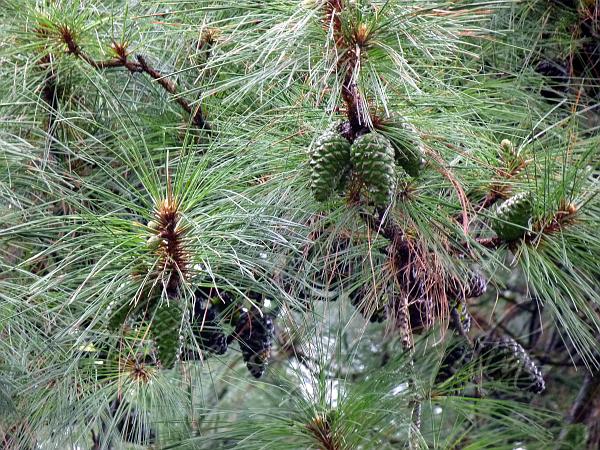|
| Khasi Pine |
|

|

| File size | 1747261 |
| Original date | 6/27/13 1:52 PM |
| Resolution | 2560 x 1920 |
| Flash | Flash did not fire, auto |
| Focal length | 103.9mm |
| Exposure time | 1/40s |
| Aperture | 5.0 |
| Focus Distance | |
| Metering Mode | Multi-segment |
| Camera make | Panasonic |
| Camera model | DMC-FZ40 |
| Sensor type | OneChipColorArea |
|
|
|
|
Photo: |
Botanical name: Pinus kesiya Family: Pinaceae (Pine family)
Synonyms: Pinus kasya, Pinus khasia, Pinus khasyana
Synonyms: Pinus kasya, Pinus khasia, Pinus khasyana
Khasi Pine is a tree reaching up to 30-35 m tall
with straight, cylindrical trunk. The bark is thick, dark brown, with
deep longitudinal fissures. The branches are robust, red brown from the
second year, the branchlets horizontal to drooping. The leaves are
needle-like, dark green, usually 3 per fascicle, 15-20 cm long, the
fascicle sheath 1-2 cm long and persistent. The cones are ovoid, 5-9 cm
long, often curved downwards, sometimes slightly distorted. The scales
of second-year cones are dense, the umbo a little convex, sometimes
acutely spinous. The scales have transverse and longitudinal ridges
across the middle of the scale surface. The seeds are winged, 6-7 mm
long with a 1.5-2.5 cm wing. Pollination is in mid spring, with the
cones maturing 18-20 months after. Khasi pine usually grows in pure
stands or mixed with broad-leaved trees, but does not form open pine
forests. Khasi pine is one of the most distributed pines in Asia. Its
range extends south and east from the Khasi hills in the northeast
Indian state of Meghalaya from where it got its name to northern
Thailand, Philippines, Burma, Cambodia, Laos, southernmost China,
Vietnam. The Khasi pine population are especially dense in India and
Burma and quite sparse elsewhere in its natural range.
| Identification credit: Tabish | Photographed in Shillong, Meghalaya. |
• Is this flower misidentified? If yes,